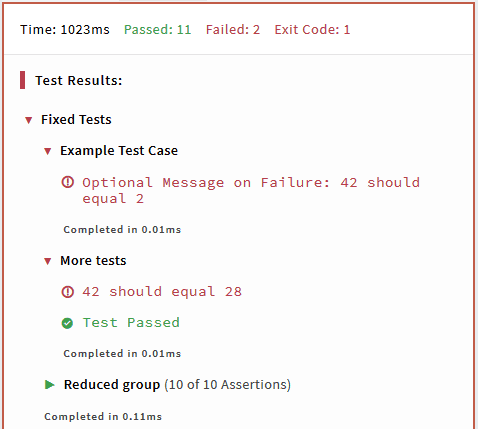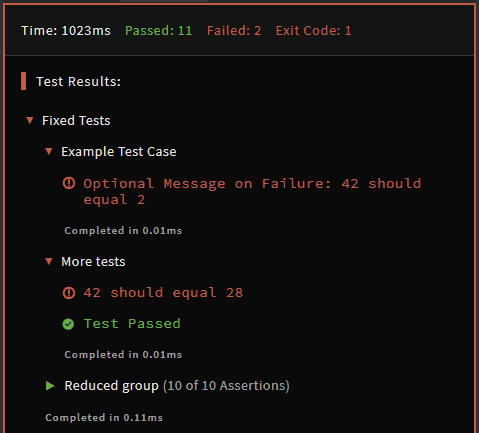Python Codewars Test Framework
Codewars currently uses a custom test framework to test Python.
Overview
The test framework allows writing named groups of tests holding other named groups of tests, containing assertions.
The basic setup for the tests follows this example:
import codewars_test as test
@test.describe('Fixed Tests')
def example_tests():
@test.it('Example Test Case')
def example_test_case():
test.assert_equals(add(1, 1), 2, 'Optional Message on Failure')
@test.it("More tests")
def more():
for a,b,exp in [(-2,30,28), (42,0,42)]:
test.assert_equals(add(a,b), exp)
@test.it("Reduced group")
def more():
for v in range(10):
test.assert_equals(add(v,v), 2*v)
@test.describe('Random Tests')
def rnd_tests():
...Deprecation
The package codewars_test does not exist for Python versions older than v3.8 where the test framework is implicitly imported and assigned to test and Test. This behavior is deprecated and the explicit import is required.
The above produces an output similar to the following:


Note that test cases don't stop on failure by default. See Failing Early to change this behavior.
Grouping Tests
The groups are created using the following decorators:
@test.describe(test_name)
def _():
@test.it(test_case_name)
def _():
...
@test.describe(subgroup_name)
def _():
...
@test.it(test_case_subgroup_name)
def _():
...Those decorators automatically run the decorated function to launch the tests.
Both kinds of blocks are timed: once the decorated function ends its execution, the time spent in the function will be displayed at the end of the block (note: for the elapsed time to be visible, the block must be deployed).
Test Group
describe block groups test cases (it). Nesting is allowed as shown above.
Always put assertions inside it and not directly in describe.
Test Case
it creates a test case containing assertion(s). Nesting will result in incorrect output.
Failing Early
Some of the functions below can accept a named argument allow_raise=False.
If you change its value to True, the tests contained inside the current block will be interrupted at the first failed test. The executions are then going back to the parent block if it exists and the next part is executed.
On some computation-heavy Kata, it may be a good idea to use this feature so that the user has not to wait a long time before getting feedback (or possibly before timing out, and in that case, they might never get any feedback at all, which may be cumbersome).
Assertions
Equality tests
test.assert_equals(actual, expected) # default message: <actual> should equal <expected>
test.assert_equals(actual, expected, message)
test.assert_equals(actual, expected, message=None, allow_raise=False)Checks that the actual value equals the expected value.
Note that because Python's equality operator checks for deep equality by default, you don't have to compare the contents of the array element by element yourself when you want to compare values as lists, tuples, sets, etc.
This function is usually the main building block of a Kata's test cases.
Non-equality tests
test.assert_not_equals(actual, unexpected) # default message: <actual> should not equal <expected>
test.assert_not_equals(actual, unexpected, message)
test.assert_not_equals(actual, expected, message=None, allow_raise=False)Checks that the actual value does not equal the (un)expected value.
Approximate equality tests
If the computations of the tests imply some floats, the exact value returned by the user may depend on the order of the different computations and he might end up with a value considered correct but not strictly equal to the expected one. For example:
a,b = 170*115/100, 170*(115/100)
test.assert_equals(a,b) # -> 195.5 should equal 195.49999999999997So, in this case, you need to use this function to check the value instead of assert_equals:
test.assert_approx_equals(actual, expected)
test.assert_approx_equals(actual, expected, margin=1e-9, message=None, allow_raise=False)
# default message: <actual> should be close to <expected> with absolute or relative margin of <margin>Checks if the actual value is close enough to the expected one, with a default relative or absolute value of 1e-9.
The comparison is done like this:
div = max(abs(actual), abs(expected), 1)
is_good = abs((actual - expected) / div) < marginSo you can compare either big or small float values without problems.
Truthness tests
test.expect(bool) # default message: Value is not what was expected
test.expect(bool, message)Checks if the passed value is truthy. This function can be helpful when you test something which cannot be tested using other functions.
However, since this function's default failure message is not helpful at all, you're strongly advised to provide your own helpful message, or even to not use test.expect. To build custom assertion functions, you could/should use the two following ones instead.
Pass and fail
test.pass_()
test.fail(message)Simply generates a passed or a failed test with a message. If your test method is very complicated or you need a special procedure to test something, these functions are probably a good choice.
Error tests
test.expect_error(message, function)
test.expect_error(message, function, exception=Exception)Checks that invoking function throws an exception.
If the argument exception is used, the raised exception must be an instance of that exception to consider the test as passed.
- Catching any exception:
Exceptionis a catch-all type. So you can check if a function throws anything doing the call without theexceptionargument. - Catching specific exception(s): the
exceptionargument can be a specific kind of exception class or even a tuple of multiple exception classes. The user throwing anyone of the specified exceptions will pass the test.
Examples:
f=lambda: {}[0] # Raises Exception >> LookupError >> KeyError
test.expect_error(msg, f) # Pass
test.expect_error(msg, f, LookupError) # Pass
test.expect_error(msg, f, OSError) # Fail
test.expect_error(msg, f, (OSError, KeyError)) # PassNo-error tests
test.expect_no_error(message, function)
test.expect_no_error(message, function, exception=BaseException)Checks this time that invoking function does not throw an exception of type exception.
- Just like in
expect_error, theexceptionparameter can be a tuple of multiple exception types or can be left unspecified too. - If during the execution of
functionan exception is raised that does not match with the parameterexception, it is silently caught and the test is considered a pass.
f=lambda: {}[0] # Raises Exception >> LookupError >> KeyError
test.expect_no_error(msg, f) # Fail
test.expect_no_error(msg, f, LookupError) # Fail
test.expect_no_error(msg, f, OSError) # PassTimeout Utility
@test.timeout(sec) # default message: Exceeded time limit of <sec> seconds
def some_function():
#do some heavy tests here...
for _ in ad_nauseam():
test.assert_equals(count_atoms_in_universe(), expected)Runs the decorated function within the time limit.
sec is the amount of time allowed. It is expressed in seconds and can be given as an integer or float.
Generates a failed assertion when the function fails to complete in time, and its execution is terminated immediately.
If the code of the user raises an exception during the executions, the error message becomes Should not throw any exceptions inside timeout: <Exception()>.
Note:
Using the timeout utility, you will get an extra assertion due to the issue of being impossible to catch exceptions thrown from a child process.
The patch (Feb 2019) used to resolve this enforces that the function does not throw any exceptions. This is done by wrapping the inner function with expect_no_error; as a side effect, you get that one extra "test passed" for a collection of tests run inside a timeout wrapper.
Corollary: don't forget to write assertions in timed tests, otherwise that "test" will be considered a pass even if the function of the user is returning the wrong value.
Acknowledgements
v2 to support grouping tests with decorators was contributed by @Bubbler-4.